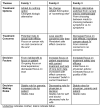Evolution of Pediatric Chronic Disease Treatment Decisions: A Qualitative, Longitudinal View of Parents' Decision-Making Process
- PMID: 25899248
- PMCID: PMC4618270
- DOI: 10.1177/0272989X15581805
Evolution of Pediatric Chronic Disease Treatment Decisions: A Qualitative, Longitudinal View of Parents' Decision-Making Process
Abstract
Background: In the context of pediatric chronic conditions, patients and families are called upon repeatedly to make treatment decisions. However, little is known about how their decision making evolves over time. The objective was to understand parents' processes for treatment decision making in pediatric chronic conditions.
Methods: We conducted a qualitative, prospective longitudinal study using recorded clinic visits and individual interviews. After consent was obtained from health care providers, parents, and patients, clinic visits during which treatment decisions were expected to be discussed were video-recorded. Parents then participated in sequential telephone interviews about their decision-making experience. Data were coded by 2 people and analyzed using framework analysis with sequential, time-ordered matrices.
Results: 21 families, including 29 parents, participated in video-recording and interviews. We found 3 dominant patterns of decision evolution. Each consisted of a series of decision events, including conversations, disease flares, and researching of treatment options. Within all 3 patterns there were both constant and evolving elements of decision making, such as role perceptions and treatment expectations, respectively. After parents made a treatment decision, they immediately turned to the next decision related to the chronic condition, creating an iterative cycle.
Conclusion: In this study, decision making was an iterative process occurring in 3 distinct patterns. Understanding these patterns and the varying elements of parents' decision processes is an essential step toward developing interventions that are appropriate to the setting and that capitalize on the skills families may develop as they gain experience with a chronic condition. Future research should also consider the role of children and adolescents in this decision process.
Keywords: chronic disease; medical decision making; parent decision making; pediatrics.
© The Author(s) 2015.
Figures
References
-
- Leslie LK, Plemmons D, Monn AR, Palinkas LA. Investigating ADHD treatment trajectories: listening to families’ stories about medication use. J Dev Behav Pediatr. 2007;28(3):179–88. - PubMed
-
- Lipstein EA, Lovell DJ, Denson LA, Moser DW, Saeed SA, Dodds CM, et al. Parents’ information needs in tumor necrosis factor-alpha inhibitor treatment decisions. J Pediatr Gastroenterol Nutr. 2013;56(3):244–50. - PubMed
-
- Brinkman WB, Sherman SN, Zmitrovich AR, Visscher MO, Crosby LE, Phelan KJ, et al. Parental angst making and revisiting decisions about treatment of attention-deficit/hyperactivity disorder. Pediatrics. 2009;124(2):580–9. - PubMed
-
- Golnik A, Maccabee-Ryaboy N, Scal P, Wey A, Gaillard P. Shared decision making: improving care for children with autism. Intellectual and developmental disabilities. 2012;50(4):322–31. - PubMed
-
- Hummelinck A, Pollock K. Parents’ information needs about the treatment of their chronically ill child: a qualitative study. Patient Educ Couns. 2006;62(2):228–34. - PubMed
Publication types
MeSH terms
Substances
Grants and funding
LinkOut - more resources
Full Text Sources
Medical



